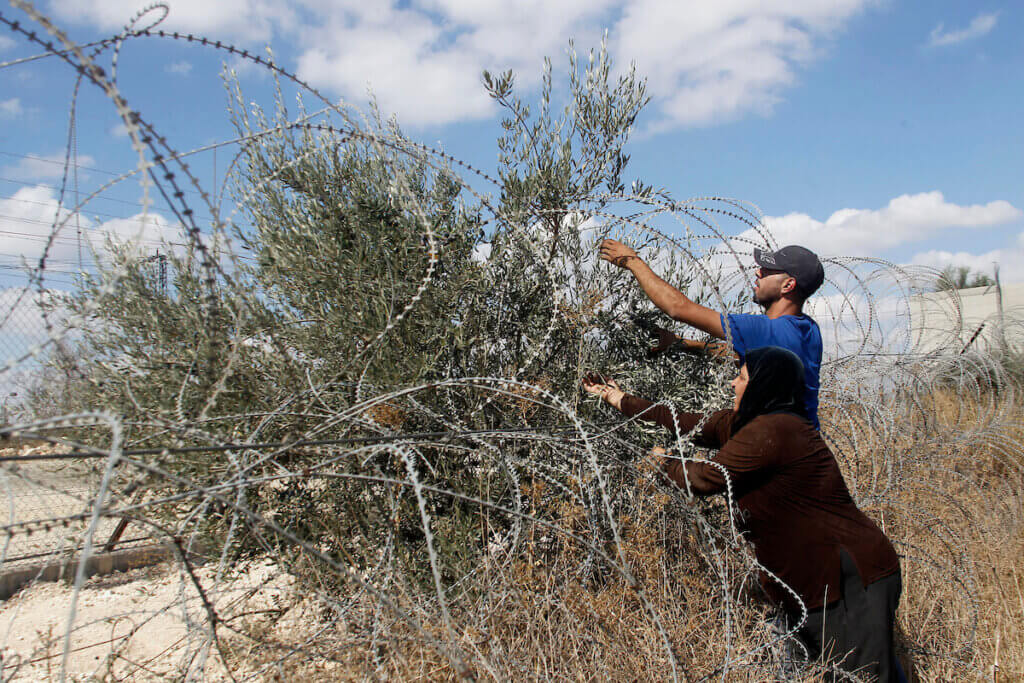Today marks the start of the Jewish holiday of Sukkot, a weeklong harvest festival. As a child, I absolutely relished this holiday, enjoying the novelty meals with my family in the sukkah, a temporary hut we built outside in ritual reference to the practices of farmers during the harvest seasons of a bygone past. As a teen, I privately started to believe that autumn had really begun once my family and I sat down underneath the open roof. As an adult, now, I seek ways to understand this ritual, the sukkah, as a space for harvesting justice.
This is why this Sukkot I am turning my efforts to support Palestinian olive farmers in the West Bank. The olive trees in Palestine date back to the Bronze Age and are an integral aspect of the culture and economy. Palestinians not only depend on the fruit for their livelihoods but the olive tree also symbolizes resistance and resilience. Olive trees are a tangible link to a history that transcends imperialism and occupation.
The olive trees in Palestine are among some of the world’s oldest species of olives, and symbolically represent the relationship between indigenous Palestinians and their land in the face of Israeli apartheid. According to the Good Shepherd Collective, more than 10 million trees are cultivated across the West Bank, farmed by some 80,000 to 100,000 families, many of whom rely on the olive harvest as their family’s primary or supplemental source of income. These farmers are subject to ongoing violence from settlers and the Israeli military who destroy, burn, or appropriate trees (sometimes for so-called security purposes). Farmers often face violence and arrests when accessing their fields.
What’s more, settlers often attack Palestinians during Jewish holidays, including Sukkot.
The olive harvest, which should be a time of productivity to set the farmers up for the year to come, has become a dangerous enterprise.
For Jewish anti-zionists outside of Palestine, methods of supporting Palestinians in their fight against structural oppression include challenging mainstream Jewish institutions that aid in the dispossession and erasure of Palestinians in Palestine.
I don’t recall if I ever dropped money into the ubiquitous blue Jewish National Fund tzedakah boxes as a regular part of my Sukkot ritual in childhood. Yet, donating money to the JNF and “planting trees in the Holy Land” are extremely common practices in Jewish communities around the world, including in my own childhood home. The money from those little blue boxes funds the planting of invasive pine trees on top of Palestinian villages destroyed in 1948 during the founding of Israel, or the Nakba.
Every year droves of tourists flock to these sites to plant trees in honor of loved ones, unaware that they’re participating in a project to erase history. A recent fire in the Jerusalem hills exposed acres worth of hidden agricultural terraces that had once been used by Palestinian farmers to mitigate the challenges of farming in a hilly landscape, planted over in an effort to erase the history of the land. Supporting Palestinians as they harvest olive trees directly undermines these efforts to conceal their history and presence on the land.

This is why this year I am not only building a sukkah at home, but starting a new ritual of building a sukkat shalom, a dwelling of peace, for Palestinian farmers under threat.
I am personally supporting the Good Shepherd Collective’s olive tree planting campaign to help farmers in the South Hebron Hills access resources needed for a fruitful harvest. I will also be joining a virtual tour of the area with Eyewitness Palestine, which provides an excellent opportunity to witness firsthand the realities in the West Bank. As a holiday rich with symbolism representing nature, the harvest, and the protection in the wilderness, Sukkot is a potent celebration to take action. Join in and help create a sukkat shalom for Palestinian farmers during this critical time of year.



An Open Letter to the Consul General of the United Kingdom from Palestinian, Samia Khoury, matriarch of Jerusalem’s renowned Khoury family:
“‘The following Headline appeared in Al-Quds, our local Arabic newspaper, on Friday, October 18. 2019: ‘Britain joins the Palestinians in the olive picking season.’
“‘It is quoting the Consul General of the United Kingdom in Jerusalem Mr. Philip Hall, that for the sixth consecutive year the UK has been supporting the Palestinians during the olive picking season. It is an opportunity for the staff of the consulate and other international volunteers to take part in this activity which is very vital for the Palestinian economy, over and above its cultural and social significance. He further emphasized the violence of the settlers in this season, and that fifteen diplomats from the Consulate and other international representatives were able to help the farmers in the Makhrour Valley where a Palestinian restaurant was recently demolished so that the settlers could start another building there.’
“‘He further referred to the increasing violence of the settlers and that this activity is considered part of the humanitarian, and political support to the Palestinian towns, especially the marginalized ones in Area C.’
“‘I could not help but respond to the item by writing back to the paper an open letter to the Consul General which I will translate in the following lines:
EXCERPT:
“‘I am sure the farmers and the owners of those olive trees are very grateful to the Consul General of the UK for this support, especially that the olive picking season has become a nightmare for the Palestinians due to the raids of the Jewish settlers with the support of the Israeli army.'”